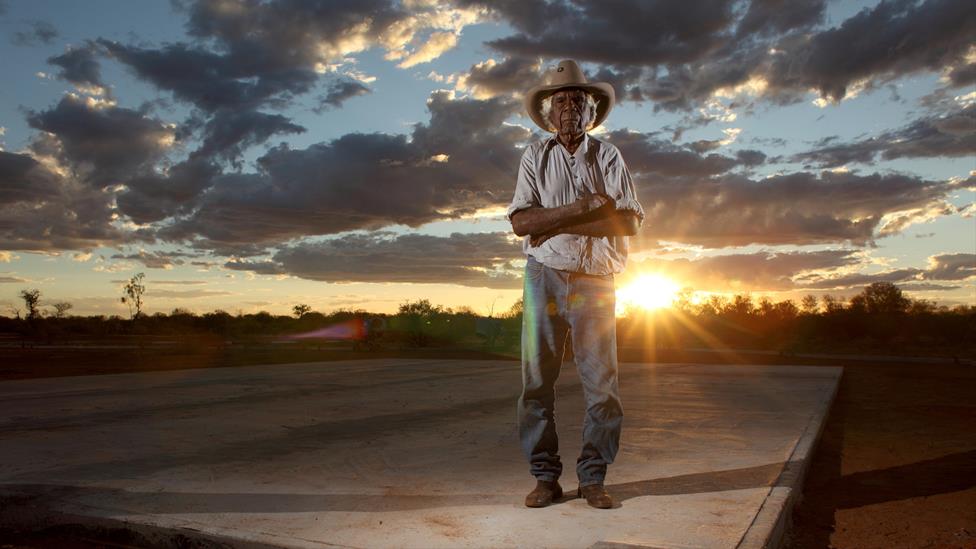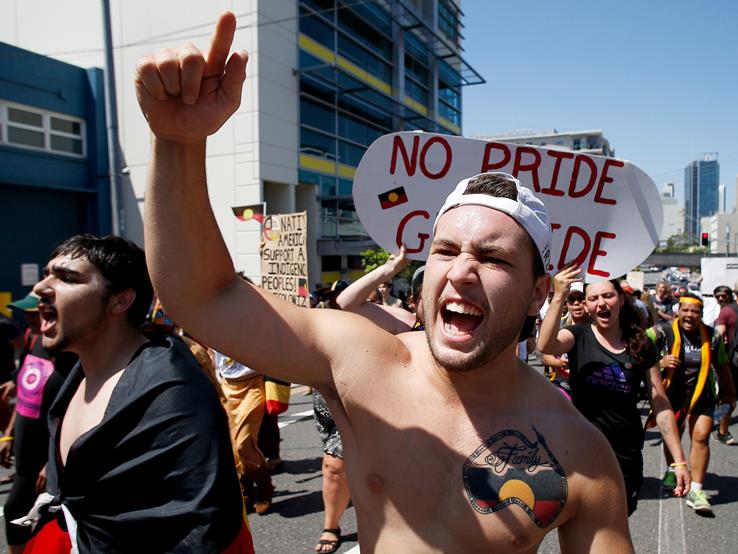February 2, 2015
Australia,
the Next Ferguson?
The scene is familiar, given all the attention around police violence in the United States: An angry crowd has amassed in front of a police station, chanting and hoisting signs that read “Touch one, touch all” and “Shame. Shame. Shame.” They are there to protest the recent deaths in custody of two members of their community.
But the protesters are not African-Americans, and this is not Ferguson, Missouri. This is Sydney — as in Australia — and the protesters are Aborigines.
The relationship between Australia’s impoverished first inhabitants and the island’s mostly white police has never been easy, but the last few months have seen unprecedented outrage. In August, a 22-year-old Aborigine died in a police watchhouse, where she was being kept for unpaid parking tickets, and two months later, another Aborigine died in prison, this one a 31-year-old man. Protests have since engulfed this otherwise peaceful nation, with Aborigines accusing law enforcement agencies of discrimination, harsh treatment and even murder. They’re using #BlackLivesMatter as inspiration, says filmmaker Alex Kelly, “and looking [at] how they could apply this in the Australian context.”
Little wonder that indigenous Australians say they identify with blacks in the U.S., many of whom attribute Ferguson to a racially biased justice system. While Aborigines represent 3.1 percent of Australia’s 23 million people, they account for nearly a third of the prison population. Meanwhile, juvenile detention rates for indigenous adolescents are about 24 times that of non-indigenous youth. The trend is of relatively recent vintage: The imprisonment rate of adult Aborigines increased 57 percent between 2000 and 2013, and the number of Aborigine deaths in custody appears to have grown.
“We are being targeted by the police. They look for any reason to put us in prison,” says Ghillar Michael Anderson, an aboriginal leader and activist. “People think Ferguson is bad? The same thing happens in Australia day in and day out.”
Not exactly. Police shootings are far rarer in the antipodes than in America, though police officers did shoot two teenagers in 2012 after they stole a car. Instead, most Aborigine deaths in custody are attributed to “natural causes” — often a previous wound or illness — which means most police officers would face charges only of negligence. Few do. None has ever been convicted.
To be sure, the government has made some efforts, though it is unclear how much reports about “Overcoming Indigenous Disadvantage” and cultural awareness programs can do. The Western Australia government is building the first prison designed to reflect “aboriginal culture and values,” a rather equivocal sign of progress — and one that seems to have done little to appease growing unrest.
“Politicians have been promising change for so long and things are actually worse than ever,” says activist Tauto Sansbury, chairman of South Australia’s Narungga people. In 1987, when a 16-year-old died in custody with massive head injuries, Australia created a royal commission to investigate and avoid such deaths. Most of its 339 recommendations were never implemented.
Not even the minister for Indigenous Affairs is indigenous.
There are few Aborigines in government who might shepherd them through. One is an ex-Olympian turned senator; the other is a provincial government leader who took office in 2013. Not even the minister for Indigenous Affairs is indigenous. It’s not for lack of trying, according to Sansbury, who unsuccessfully ran for office a few years ago: “Major parties will never make an effort to put aboriginal candidates forward.”
This is more than just sour grapes. Australia’s charter still states that the country was unpopulated before the British arrived. (Prime Minister Tony Abbott promises a constitutional referendum in 2017 to recognize Aborigines as the nation’s first people.) And Aborigines didn’t get the right to vote until 1967, two centuries after Capt. James Cook claimed Australia for the British crown in 1770. In 2008, the government apologized for settler wrongs to Australia’s first peoples, but most policies focus on managing this minority instead of empowering them. That’s in marked contrast to the U.S., where affirmative action has helped lessen discrimination, or New Zealand, which has paid millions in reparations to the native Māori people.
For many in Australia’s indigenous community, the only solution is to increase self-determination and transfer political decision-making power to aboriginal communities. Some groups want recognition as independent nations. In November 2014, Sansbury organized the National Freedom Summit for Aboriginal People to discuss such ideas; they say it will be the first of many. Meanwhile, demonstrations continue. On Feb. 13, aboriginal leaders will stage a national protest in the capital, Canberra, bringing buses full of activists from across the country to demand political action.
Will the Aborigine movement’s newfound stamina be enough to turn the 200-year-old tide? Unlikely. But there’s strength in desperation and, as Anderson puts it, “something must change because things cannot get worse.”
+++++++++++++++

Laura is an obsessive story hunter with a serious case of itchy feet. From her base in Spain, she has embarked on a “one month, one country” mission, acting as OZY’s eyes and ears east of the Atlantic. She can be found cooking for friends, sipping a cortado at a street-front café or packing for her next big adventure.



